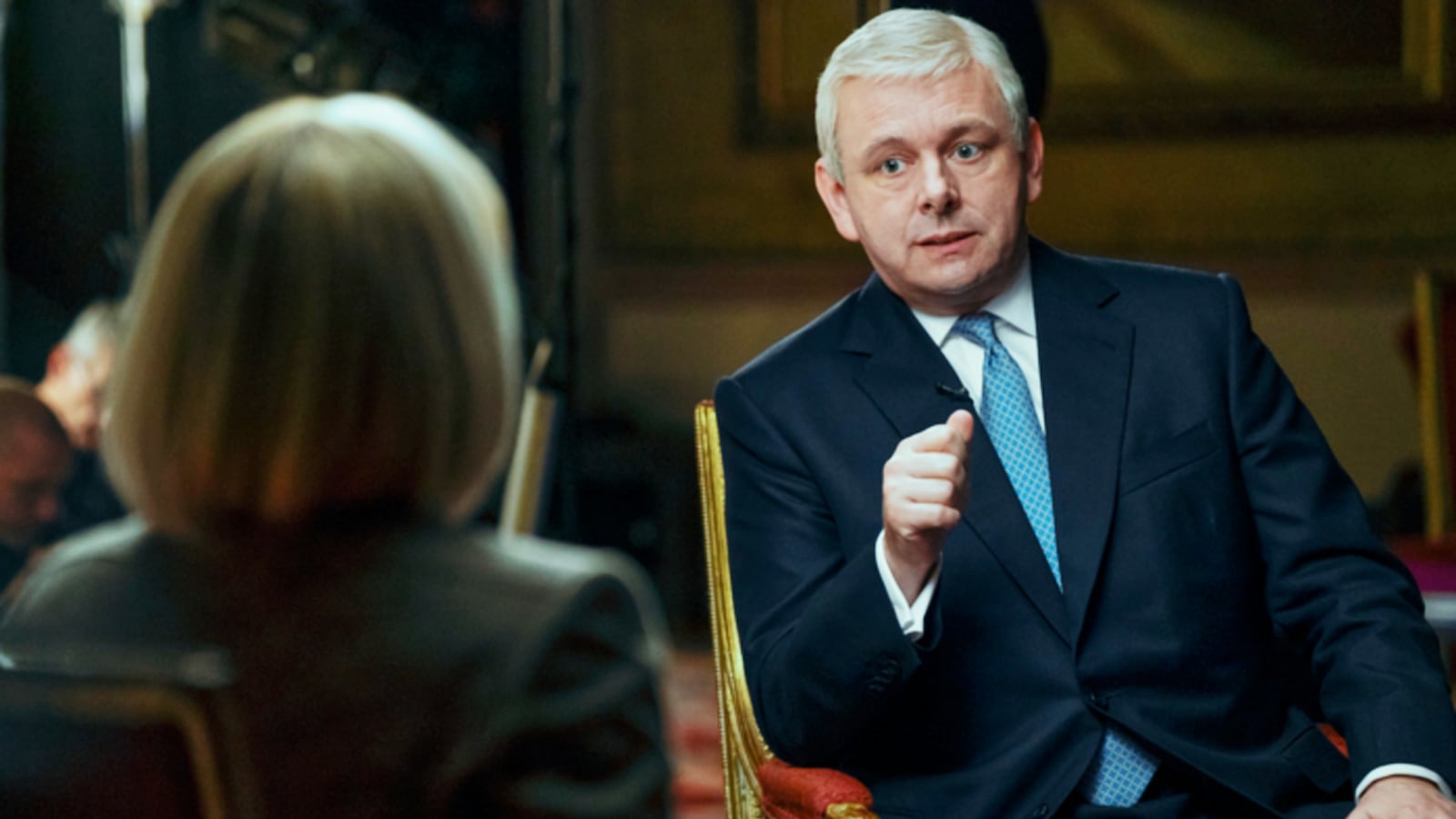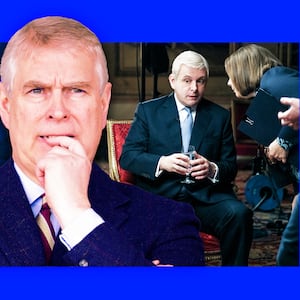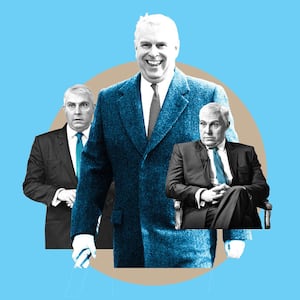Prince Andrew’s car-crash interview with BBC Newsnight’s Emily Maitlis in 2019 was many things. Another nail in the coffin for the British monarchy. A masterclass in how not to defend yourself against allegations of sexual assault. An unofficial advertisement for the Woking branch of Pizza Express. But worthy of spawning two star-studded dramatizations in the space of five months?
Following in the footsteps of twin movies such as Deep Impact/Armageddon, Antz/A Bug’s Life and the two schadenfreude-dripping Fyre festival docs, Amazon’s A Very Royal Scandal arrives soon after Netflix’s Scoop first explored how two of Britain’s biggest institutions so infamously aligned. Surely the streaming giant is vastly overestimating public interest in a conversation which, although jaw-dropping in its remarkable candidness and self-unawareness, hardly changed the course of history?
Well, possibly. Anyone who sat through Scoop—a surface-level retelling which dedicated more time to no-nonsense booking agent Sam McAlister than the story’s two central figures (admittedly, it was based on her memoir)—is unlikely to spend an additional three hours watching the machinations of the same TV interview. Nevertheless, just like the A Very ... Scandal anthology did with two other high establishment sagas (the Thorpe affair, the Argyll divorce), this third instalment digs further to bring something new to the aristocratic table.
The fact the three-parter is executive produced by Maitlis herself instantly lends a certain gravitas. Portrayed by Ruth Wilson far more convincingly than the stilted Thatcher-lite impersonation offered by Scoop’s Gillian Anderson, the dogged journalist rightfully shares center stage here. Yet this isn’t some glorified hagiography.

Michael Sheen in A Very Royal Scandal
Christopher Raphael/Prime VideoSure, A Very Royal Scandal does celebrate Maitlis’ achievements, whether the killer riposte to Andrew’s mealy-mouthed description of Jeffrey Epstein (“Unbecoming? He was a sex offender?”) or RTS award she subsequently received. The glimpses into her home life with supportive husband Mark (Nicholas Burns) also help humanize her (even if she treats their breakfasts together like her political podcast), as do the vulnerable insights into her own experiences of abuse.
Admirably, though, it doesn’t always present Maitlis in the most flattering light. We first see her visibly flustered rocking up late to Buckingham Palace, while her obvious delight at being fawned over on Good Morning America suggests her inquisitive skills are matched by her ego. Furthermore, in the most revealing aspect of the notorious tête-à-tête, it’s disclosed she initially failed to ask the two questions that ultimately sparked the biggest headlines.
No stranger to the royals, Jeremy Brock (Mrs. Brown) still takes plenty of artistic license, peppering his razor-sharp script with exchanges only those within the notoriously guarded regal circles would have been privy to. Did Andrew throw a tantrum when it became evident his PR strategy had so horrendously backfired? And did he really learn about both Epstein’s death and the Newsnight fallout in the middle of playing parlor games?
However things were dealt with behind closed doors, Michael Sheen’s depiction—as you’d expect from a man who’s inhabited everyone from Tony Blair to David Frost (watch out for Andrew’s meta reference) with a near-ruthless efficiency—always rings true. The master impresario certainly embodies the prince’s natural entitlement more effectively than Rufus Sewell, whose milder-mannered portrayal in Scoop suggests he didn’t want to risk a future OBE (it’s telling that even Andrew himself was reportedly flattered.
Sheen, however, has more to offer than mere impersonation, fleshing out a character whose response to the scandal runs the gamut from nonchalance and bewilderment to fear and unbridled rage. “I fought for Queen and country, all he did was talk to the roses and shag his missus,” Andrew barks on losing his golden boy status to brother Charles, one of several zingers Sheen delivers with relish. He also apparently enjoys throwing the F-word around with as much wild abandon as Logan Roy.

Ruth Wilson in A Very Royal Scandal
Christopher Raphael/Amazon StudiosFlashbacks to Andrew’s encounters with Epstein (John Hopkins channeling the right amount of smarm)—including that infamous ‘break-up’ walk in Central Park—also provide further context. Likewise, the real-world footage of Virginia Giuffre recounting her trauma and brief recollections of the offending night in question which stops Andrew in his tracks. The Newsnight special may have provided several moments of unintentional comic gold, but A Very Royal Scandal never forgets the darkness from which they stemmed.
Of course, there’s an argument to be made about whether TV really needs to dramatize real-life events that have only recently played out on camera (see Joe vs. Carole, This England). But the direction from Julian Jarrold (A Royal Night Out) imbues the familiar with cinematic flair and a greater sense of occasion.
While Scoop retained the original interview’s rather staid atmosphere, A Very Royal Scandal treats the back-and-forth like a sporting duel. The close-up of Maitlis as she prepares her opening gambit, for example, evokes a tennis player about to deliver their opening serve. It’s practically Challengers-esque. Then there’s the contrasting ‘crowd shots’ from behind-the-camera—the royal camp exasperated at how Andrew is pressing the self-destruction button, the Beeb’s incredulous at the TV gold they’ve been handed on a plate.
Equally gripping are the insights into the BBC newsroom where Maitlis first pitches the idea of going after Andrew, much to the skepticism of editor Esme (Lydia Leonard). (“The Beeb doesn’t do royals. Not since Bashir’s Diana interview. More trouble than it was worth”). Negotiations with Amanda Thirsk (Joanna Scanlan), Andrew’s blatantly smitten press secretary, and Sir Edward Young (Alex Jennings), the Queen’s representative who clearly understands he’s a walking liability, repeatedly turn on a dime. Meanwhile, the pressure cooker race to transmission somehow draws nail-biting tension from a continuity issue with Maitlis’ hair.

Gillian Anderson and Rufus Sewell in Scoop
NetflixThe Crown viewers will be pleased to know there’s plenty of royal drama away from the televised encounter, too. Fergie (Claire Rushbrook) regularly pops up to offer her ex-husband a comforting shoulder, even if it’s not always wanted; daughters Eugenie (Sofia Oxenham) and bride-to-be Beatrice (Honor Swinton Byrne) are shown struggling to equate the father they worship with the sleazeball depicted in the press; while in a rare display of self-realization, the prince reflects with all three on how membership of the royal family comes at an emotionally distant cost.
The third episode, which centers squarely on the interview’s aftermath, could be accused of extending a little too much sympathy. Maitlis shows flickers of remorse as the question, “How does it feel to take down a member of the monarchy?” starts ringing in her ears.
Moreover, a catch-up between Amanda and her BBC ally Stewart (Éanna Hardwicke) almost plays out like a legal argument for Andrew’s defense. Thankfully, the balance is readdressed for the final scene—and post-credits update—which hammers home the royals’ air of privilege and uncanny inability to hold themselves to account.
Andrew versus Maitlis, therefore, wasn’t as consequential as its two small screen adaptations would indicate. However, by delving deeper into the man who caused the “clusterf--- worthy of the Kardashians,” the far more compelling A Very Royal Scandal should better test his apparent inability to sweat.








